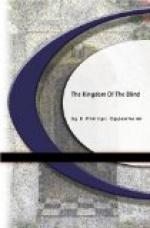the left, leading down to the Admiralty. There
he paused for a moment, and, turning around, listened
intently. He was possessed of particularly keen
hearing and it seemed to him as though from afar off
he could hear the sound of a thousand muffled hammers
beating upon an anvil; of a strange, methodical disturbance
in the air. He grasped the railing with one hand
and gazed upward with straining eyes. Just at
that moment he saw distinctly what appeared to be
a flash of lightning in the sky, followed by a report
which sounded like a sharp clap of thunder. Then
instinctively he covered his eyes with his hands.
From a dozen places—one close at hand—a
long, level stream of light seemed to shoot out towards
the clouds. There was one of them which came
from near the Carlton Hotel, which lit up the whole
of the Pall Mall Arch with startling distinctness,
gave him a sudden vision of the Admiralty roof, and,
as he followed it up, brought a cry to his lips.
Far away, beyond even the limits of the quivering
line of light, there was something in the sky which
seemed a little blacker than the cloud. Even while
he looked at it, from the Admiralty roof came a lurid
flash, the hiss and screech of a shell as it dashed
upwards. And then the sleeping city seemed suddenly
to awake and the night to become hideous. Not
fifty yards away from him something fell in the Park,
and all around him lumps of gravel and clods of earth
fell in a shower. A great elm tree fell crashing
into the railings close by his side. Then there
was a deafening explosion, the thunder of falling masonry,
and a house by the side of the arch broke suddenly
into flames. A few moments later, a queer sight
amongst all these untoward and unexpected happenings,
a fire engine dashed under the arch, narrowly missing
the broken fragments of brick and stone, swung around,
and a dozen fire-hoses commenced to play upon the
flaming building.
The darkness was over now, and the silence. There
were houses on the other side of the river on fire,
and scarcely a moment passed without the crash of
a falling bomb. The air for a second or two was
filled with piteous shrieks from somewhere towards
Charing-Cross, shrieks drowned almost immediately
by another tremendous explosion from further north.
Every now and then, looking upwards in the line of
the long searchlights, Thomson could distinctly see
the shape of one of the circling airships. Once
the light flashed downwards, and between him and Buckingham
Palace he saw a great aeroplane coming head foremost
down, heard it strike the ground with a tremendous
crash, heard the long death cry, a cry which was more
like a sob, of the men who perished with it. . . .
Every moment the uproar became more deafening.
From all sorts of unsuspected places and buildings
came the lightning quiver of the guns, followed by
the shrieking of the shells. Right on to the tops
of the houses between where he was standing and the
Carlton, another aeroplane fell, smashing the chimneys
and the windows and hanging there like a gigantic
black bat. There was not a soul anywhere near
him, but by the occasional flashes of light Thomson
could see soldiers and hurrying people in the Admiralty
Square, and along the Strand he could hear the patter
of footsteps upon the pavement. But he himself
remained alone, a silent, spellbound, fascinated witness
of this epic of slaughter and ruin.




